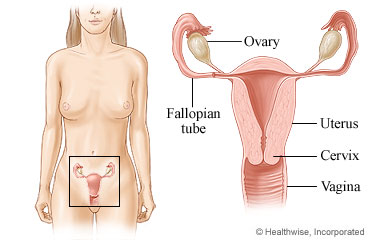
What is a hysteroscopy?
A hysteroscopy is a procedure to find and treat problems with your uterus. It may be done to remove growths from the uterus, such as fibroids or polyps. It may also be used to diagnose and treat abnormal bleeding or fertility problems.
The doctor will guide a lighted tube through the cervix and into the uterus. This tube is called a hysteroscope, or scope. The doctor will fill your uterus with air or liquid. This makes it easier to see the inside of your uterus with the scope. The doctor may also put tools through the scope to treat a problem.
During this procedure, the doctor may take out a small piece of tissue for study. This is called a biopsy. Or the doctor may gently scrape tissue from the inner wall of the uterus. This is called a dilation and curettage, or D&C.
If your doctor filled your uterus with liquid, most of it will flow out when the scope is removed.
You will most likely go home the same day. And you will probably be able to go back to work the next day. But it depends on what was done and the type of work you do.
How do you prepare for the procedure?
Preparing for the procedure
- Schedule your test for when you won't be having your period. Your doctor may suggest that the test be done soon after your period ends and before your ovary releases an egg (ovulates). This timing allows your doctor to see the inside of your uterus better. It also avoids doing the test when you could be pregnant.
- Your doctor may give you medicine to take before the test that will help open your cervix. This medicine may be placed in your vagina or taken as a pill. Or you may go to your doctor's office on the day before the procedure so that your doctor can put a small sponge in your cervix. This also helps to open your cervix.
- You may be asked not to douche, use tampons, or use vaginal medicines for 24 hours before the hysteroscopy.
- Ask your doctor if you will need someone to take you home. Anesthesia and pain medicine can make it unsafe for you to drive or get home on your own.
- Understand exactly what procedure is planned, along with the risks, benefits, and other options.
- Tell your doctor ALL the medicines, vitamins, supplements, and herbal remedies you take. Some may increase the risk of problems during your procedure. Your doctor will tell you if you should stop taking any of them before the procedure and how soon to do it.
- If you take a medicine that prevents blood clots, your doctor may tell you to stop taking it before your procedure. Or your doctor may tell you to keep taking it. (These medicines include aspirin and other blood thinners.) Make sure that you understand exactly what your doctor wants you to do.
- Make sure your doctor and the hospital have a copy of your advance directive. If you don't have one, you may want to prepare one. It lets others know your health care wishes. It's a good thing to have before any type of surgery or procedure.
What happens on the day of the procedure?
-
Follow the instructions exactly about when to stop eating and drinking. If you don't, your procedure may be canceled. If your doctor has instructed you to take your medicines on the day of the procedure, take them with only a sip of water.
-
Take a bath or shower before you come in for your procedure. Do not apply lotions, perfumes, deodorants, or nail polish.
-
Take off all jewelry and piercings. And take out contact lenses, if you wear them.
At the hospital or surgery center
-
Bring a picture ID.
-
You will be kept comfortable and safe by your anesthesia provider. The anesthesia may make you sleep. Or it may just numb the area being worked on.
-
The procedure usually takes less than 30 minutes. But it may take longer if a treatment (like a polyp removal) is done during the test.
When should you call your doctor?
- You have questions or concerns.
- You don't understand how to prepare for your procedure.
- You become ill before the procedure (such as fever, flu, or a cold).
- You need to reschedule or have changed your mind about having the procedure.
Where can you learn more?
Go to http://www.healthwise.net/patientEd
Enter F424 in the search box to learn more about "Hysteroscopy: Before Your Procedure".
Current as of: April 30, 2024
Author: Ignite Healthwise, LLC Staff
Clinical Review Board
All Healthwise education is reviewed by a team that includes physicians, nurses, advanced practitioners, registered dieticians, and other healthcare professionals.

